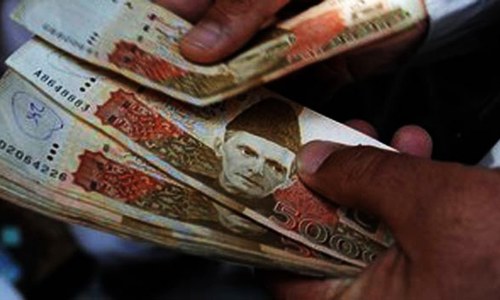Pakistan has frozen the accounts of 5,000 suspected terrorists, taking about $3 million out of their pockets, but Islamabad could still come under scrutiny at a crucial June meeting of an international watchdog that tracks terror financing.
Analysts and government officials say political foot-dragging and sympathetic supporters throughout Pakistan makes it difficult to cut off the money supply to banned terrorist groups.
Next month in Spain, the Financial Action Task Force will update its assessment of “high-risk and non-cooperative jurisdictions,” Alexandra Wijmenga-Daniel of the task force's communications department said in an email. She did not offer any specifics.
The 35-nation intergovernmental organisation was formed in 1989 to combat money laundering. After 9/11, it also took on the role of fighting the financing of terrorism. Getting on the task force's “black list” could hurt a country's ability to borrow, if its banking system is considered a money laundering haven.
In 2015, Pakistan was exempted from its scrutiny after a similar session applauded the country's progress in tackling both money laundering and terrorist financing.
However, concerns have been raised regarding the resurrection of banned groups such as Lashkar-i-Taiba under new names. Also worrying is the operation of groups such as Jaish-i-Mohammed, which is openly running seminaries and fundraising.
Explore: Banned outfits in Pakistan operate openly on Facebook
“The government has to find a way to completely ban individuals and groups [suspected of terrorist activity] from operating. This is the only way,” said Muhammad Amir Rana, director of the Islamabad-based Pakistan Institute of Peace Studies (PIPS).
Still, the National Counter Terrorism Authority (Nacta) has begun the painstaking work of devising anti-terror financing policies, freezing bank accounts of known terrorist groups and identifying those that have resurfaced with different names, according to its director, Ishan Ghani.
Nacta was established in 2013 through an act of Parliament. Four years later, Ghani says it is “still in its formative stage”.
When he took over Nacta 18 months ago, it had a staff of only 25, including drivers, despite a government promise to bring in about 800 people with the job of curbing money laundering and terrorism financing.
Ghani blamed the slow start on a lack of government commitment and jurisdictional battles within the bureaucracy.
Explore: The roots of terrorism
Since taking over, Ghani has increased his staff to 100, gotten a budget of Rs1.8 billion and is updating a list of individuals suspected of terrorism. He also has devised a sweeping policy on which new, stricter laws can be enacted.
He said its current lists are outdated, with several suspected terrorists either dead or in jail, and the job of identifying individuals suspected of links to terrorism rests with the provinces.
The names have been slow in coming, Ghani added, blaming outdated systems, political foot-dragging and a lack of focus on counterterrorism despite military and police operations against suspected hideouts particularly in the tribal regions bordering Afghanistan.
Politicians have been reluctant to shut down some of the reconstituted terrorist groups because of the local support they enjoy and the votes they bring in.
Still, Ghani said he has had some success pressing provincial lawmakers into action.
Ghani recounted an incident last year during Ramazan, when fundraising often goes into high gear.
He received reports that outlawed groups with terror links were openly raising cash. He put all four provinces on notice, warning them to stop the fundraising.
This year, Nacta is circulating a list of acceptable charities to which the faithful can donate. These organisations, Ghani said, were “not affiliated with terrorism”.
Explore: Laws for monitoring NGOs’ funding to be tightened
Hasan Akbar, executive director of the Islamabad-based Jinnah Institute, said Pakistan has made some progress tackling money laundering, “shutting down businesses that had a sweep not just in Pakistan but in Dubai and the United States.”
There even has been progress against those groups that resurface under a new name.
“Organisations have been banned, but also in the last year funds have been seized of even those groups emerging as replacements for the banned groups,” Akbar said.
Still, individual donations and support from small businesses provide a steady income to banned outfits that is difficult to track, he said.
Explore: Data centre to tackle money laundering, terror financing
“Challenges still remain in sectarian and jihadi groups where they get individual donations from traders and merchants in urban and rural areas,” he said. “How do you stop that? That base of support is still there. This is hard to document.”
Rana of PIPS said banned organisations also collect money in mosques outside the country, then return home with the funds.
Saudi Arabia is particularly lucrative, and the fundraising by outlawed sectarian groups is done openly, he said.
“Many banned organisations have very traditional methods of collecting money. They go to Saudi Arabia or the United Kingdom, for example, and go into mosques,” he said, adding that the fundraiser usually is given a few minutes to speak to the congregation and asks for donations.
Ghani said that among the policies he is crafting is one to regulate cash transfers, a widely used practice in Pakistan. The policy will require anyone transferring Rs1 million or more to identify the origins of the money.
“Today, you could carry Rs50m around in your car and no one would say anything, but we are coming up with a policy and laws that will require an explanation and the disclosure of the money trail,” Ghani said.













































